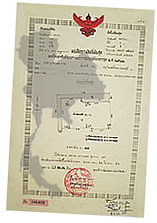Limited Company
nominee shareholders in a Thai company
A limited company in Thailand must have a minimum of 3 shareholder at all times. Thai nationals operating a business under a company often use nominee shareholders to complete the number of 3 shareholders in the limited company. There is no general restriction for Thais that prohibited the use of nominee shareholders in a business. This is different for foreigners. Foreign investors are prohibited from using nominee shareholders in a Thai company under the foreign business act. Also bearer shares (shares owned by whoever holds the physical share certificate) are prohibited.

 Inheritance Laws
Inheritance Laws